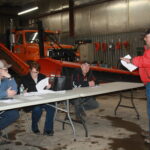PRESQUE ISLE, Maine – A presentation held Tuesday morning at City Hall resulted in officials of the Presque Isle Water/Sewer District planning to extend a water pipeline from the district’s treatment facility on Dyer Street to the Aroostook River and the Solid Waste Department moving forward with plans to upgrade the city’s landfill, thanks to the receipt of over $10 million in grants and loans from the USDA. “This is a very exciting event for both the city and the Water/Sewer District,” said City Manager Tom Stevens at the meeting. “For the city, it has to do with the landfill and the significant upgrades it needs, including a partial closure to bring it up to standards for the DEP. This has been a huge effort spearheaded by Dana Fowler, director of the Solid Waste Department. He’s an engineer by trade and does a very good job managing the landfill.”
Stevens said the type of loan the city was receiving to do the project at the landfill was made possible through the hard work of many people, including Sens. Olympia Snowe and Susan Collins, Congressman Mike Michaud, City Council and the various city officials involved with each department, as well as members of the USDA staff.
“Such a loan helps lower costs to users (of the landfill) and taxpayers. It impacts everyone who uses the landfill,” said Stevens.
On hand to make the presentation was Michael W. Aube, state director of the USDA.
“Over $25 million is being presented in the area over the next couple days,” said Aube.
The Presque Isle Water/Sewer District received a Water and Waste Water Disposal Loan of $2,950,000, as well as a grant for $2 million. The loan is scheduled to be repaid over a 40-year period. The Solid Waste Department received a Water and Waste Disposal Loan for $6,310,000 to be repaid over a 30-year period.
Aube noted additional funds would be distributed throughout the next couple of days in the communities of Fort Kent, Caribou and Fort Fairfield. The town of Fort Kent received a Rural Business Enterprise Grant for $98,000 to purchase equipment, presented Tuesday afternoon; Northern Maine Medical Center received a Community Facilities Guaranteed Loan Tuesday afternoon in the amount of $1.2 million to construct a medical office building; a Rural Business Opportunity Grant in the amount of $49,837 was presented Tuesday as well to the University of Maine at Fort Kent to benefit the communities of the St. John Valley. On Wednesday, the Northern Maine Development Commission received a Rural Business Enterprise Grant for $199,000 to be used to assist in the delivery of technical assistance and other support to area manufacturers, as well as other services for the region’s tourism industry; NMDC also received a Rural Enterprise Enterprise Grant for $387,000 that same day for the purchase of a building in Caribou to help facilitate the development of small and emerging private business enterprises in a rural community; and the Tri-Community Recycling and Sanitary Landfill, located in Fort Fairfield, was presented Wednesday with a Water and Waste Disposal Loan in the amount of $12 million to be used for various projects and upgrades.
“Our mission is to try to support the types of activities local communities wish to do to help sustain their communities,” said Aube.
Aube credited the work of Dick Ireland and the staff of the local USDA Office for watching for available funding and making the appropriate parties aware of such, working with departments to obtain the needed funds.
“Dick and his staff continue to see funds available in the pipeline,” and work to get the funds into the hands of those who need them the most, said Aube.
Stephen Freeman, superintendent of the Water/Sewer District, explained what the $4.9 million will be used for.
“The funds will be used for our outfall relocation project – pipeline project – extending a line from our Dyer Street facility to the Aroostook River. Over the years, processed water has been going into the Presque Isle Stream. The DEP did water quality research and found we did have an impact on the stream – algae growth lowered the oxygen level in the stream. Even a special treatment plan in the summer didn’t solve the problem. A second test noted, despite treatment, water (from the facility) still had an adverse reaction on the stream,” said Freeman.
Freeman said his department has been working since the 1990s to correct the problem, only recently getting the go-ahead to extend a pipeline directly to the Aroostook River. The estimated cost of the project is $5 million. The grant and loan will be nearly enough to complete the project.
Fowler spoke next, noting what the Solid Waste Department will do with the funds.
“Work began a month ago and will continue two more. Phase one started this year; we’ll close out two sides of the landfill with a special blanket. Phase two next year will involve installing an active gas extraction system; in 2009, we’ll expand the landfill,” said Fowler.
Fowler said his department was, “making a major investment not just for the future of Presque Isle but the six other communities served by the landfill.”
He acknowledged that Ireland was responsible for the first funding made available for the landfill in 1981—a state-of-the-art system at the time.
“With this loan, Ireland is once again involved in creating a state-of-the-art facility once again,” said Fowler.
Aube acknowledged the USDA continues to look for ways to improve the infrastructure of Maine communities.
“The cost of infrastructure in Maine is overwhelming. I’ll be attending a meeting in November where one of the questions of concern is, ‘How do you find resources at the local, state and federal level to pay for new technologies.’ This is (these projects) a good example of what communities are struggling with. Costs have grown exponentially,” said Aube, noting the USDA will continue to look for ways to assist communities to grow and prosper.
Stevens said he appreciates ever dime received.
“While the city will have to pay back a portion of the funds received as loans, it’s still very much appreciated and will be used for projects that have been in the works for some time now. We’re grateful for the USDA and all it does for communities, especially rural communities like those in Aroostook County,” said Stevens.
Presque Isle, ME
15
Clear
Houlton, ME
18
Clear
Caribou, ME
16
Clear
Fort Kent, ME
14
Clouds
Change Location
- Presque Isle
- Houlton
- Caribou
- Fort Kent
© 2024 Bangor Publishing Company.







